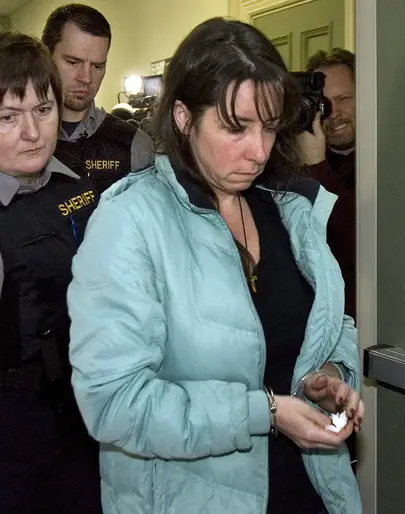Penny Boudreau, a Nova Scotia woman, infamously strangled her 12-year-old daughter, Karissa, in a tragic incident that has haunted the community since 2008. Now, she is under consideration for unescorted temporary absences from her life sentence in prison, leading to renewed media attention on her case. The Parole Board of Canada has signaled that a hearing regarding her parole could take place as early as June 2025, igniting ongoing discussions about her second-degree murder conviction and the implications of her potential release. With her history of escorted absences for various activities, including family visits, Boudreau’s case raises essential questions about public safety and the effectiveness of the justice system in handling such severe cases. While advocates mention her low risk of reoffending, many community members remain deeply concerned about the Nova Scotia murder case and the emotional turmoil still felt by the victims’ loved ones.
The situation surrounding Penny Boudreau’s potential for parole highlights critical themes in discussions of crime and punishment. Known for her horrific act of taking her daughter’s life, Boudreau’s case has become a focal point for examining the nuances of second-degree murder convictions and their consequences. As she seeks temporary absences from prison, the psychological evaluations indicating her low reoffending risk have reignited debates about the balance between rehabilitation and public safety. Additionally, the community’s reaction underscores the ongoing impact of such incidents on the collective psyche, with many still mourning the loss of Karissa Boudreau. This case has implications that resonate beyond the courtroom, as it brings to light the complexities of the justice system in cases of severe familial violence.
Understanding the Karissa Boudreau Case
The tragic case of Karissa Boudreau remains etched in the memories of many in Nova Scotia. Penny Boudreau, her mother, was convicted of second-degree murder after a harrowing act that led to the death of her 12-year-old daughter in 2008. This case has not only drawn considerable media attention but has also sparked public debates on parental responsibilities and mental health issues. Karissa’s death, coupled with the circumstances that led to it, raises crucial questions about the systemic failures that sometimes enable such tragic events.
In the aftermath of this crime, the community has grappled with the impact on families and individuals who were connected to Karissa. Victim impact statements presented during Penny Boudreau’s hearings reveal the deep emotional scars remaining within the community. As they continue to mourn the loss of a young life full of potential, the broader implications of the case serve as a stark reminder of the sometimes unseen struggles faced by families.
Penny Boudreau’s Parole Hearing Controversy
Penny Boudreau’s potential eligibility for unescorted temporary absences from prison has ignited intense discussion around her case and the justice system in Canada. While the Parole Board of Canada considers her psychological evaluations and conduct since her incarceration, many argue that her past actions should prevent any leniency in her sentence. The community’s emotional response highlights a complex relationship between forgiveness, justice, and the perception of rehabilitation in violent crime cases.
Critics point out that allowing Boudreau to apply for temporary absences undermines the severity of her crime and raises concerns about safety. With her next hearing scheduled for June 2025, community members and victim advocates remain vigilant, emphasizing that leniency in high-profile murder cases like this can set a concerning precedent. The ongoing dialogue surrounding Boudreau’s parole hearings reflects broader societal challenges regarding how we treat offenders, especially in cases that involve grievous harm to loved ones.
Temporary Absences Programs in Canadian Prisons
Temporary absences from prison are a significant part of Canada’s correctional system, designed to facilitate the reintegration of offenders into society. These programs, including escorted and unescorted absences, aim to assess an inmate’s likelihood of rehabilitation and their ability to interact safely with the community. Penny Boudreau’s prior successful completion of escorted absences for family visits and church attendance suggests a pathway toward increased freedom within the confines of the parole system.
However, the implementation of such programs often stirs debate. Advocates argue that they provide a necessary step for rehabilitation, whereas detractors point to instances where released individuals have reoffended. The Murderers Parole Board’s assessment of individual cases like Boudreau’s reflects the significant challenge of balancing public safety with the rights and rehabilitation opportunities afforded to individuals serving sentences for violent crimes.
Community Reactions to Boudreau’s Case
The community’s response to the possibility of Penny Boudreau’s more favorable parole conditions has sparked significant backlash from various stakeholders. Many residents express concern that facilitating her temporary absences disregards the severity of her actions and the lasting impact of her crime on the community, particularly on the family of Karissa Boudreau. This apprehension reflects deep-seated fears about justice being served appropriately and the psychological ramifications that decisions of this nature have on surviving victims and their families.
Survivors of violent crime and advocates emphasize the importance of elevating victims’ voices in discussions about parole and rehabilitation. Victims’ rights groups argue that leniency in cases where lives are irrevocably altered sends the wrong message about accountability and justice. The public discourse surrounding the Boudreau case underscores the complexities within the justice system, where the challenges of seeing both rehabilitation and justice must be navigated carefully.
Penny Boudreau’s Psychological Assessments
Penny Boudreau’s psychological assessments play a crucial role in determining her eligibility for parole and reflecting her mental health status since her incarceration. Evaluating her risk of reoffending, these assessments have consistently indicated a low risk, helping to support her case for increased privileges. While this may suggest improvement or rehabilitation, it raises questions about the reliability of psychological evaluations in such severe cases, especially in matters concerning violent crime.
The accuracy of these assessments is often scrutinized, especially in high-profile cases like that of Boudreau. Critics may argue that psychological evaluations should not solely dictate parole eligibility, particularly when the crime involved profound personal loss and trauma for the victims’ families. The balance between understanding a convict’s psychological state and ensuring public safety remains a critical conversation in the realm of criminal justice.
Legal Framework for Parole Decisions
The legal framework governing parole decisions in Canada provides a structured process for evaluating inmates eligible for reentry into society. The Parole Board of Canada employs criteria based on risk assessments, behavior in prison, and overall rehabilitation to determine parole eligibility. For Penny Boudreau, these criteria mean that her past actions and current assessments must be weighed thoughtfully to ensure that the decision made aligns with both justice and public safety.
In cases involving violent crimes, the decision-making process can become particularly contentious, balancing rehabilitation opportunities against strong community sentiments and the rights afforded to victims. As Boudreau’s potential hearing approaches, various legal aspects surrounding her parole eligibility will be scrutinized, reflecting the ongoing tension within the justice system of weighing individual rights against community safety.
The Impact of Media Coverage on Boudreau’s Case
Media coverage surrounding Penny Boudreau’s case has significantly shaped public perception and discourse about her possible parole. As high-profile cases attract media attention, the narratives presented can influence community sentiments while also providing a platform for victim advocates to voice their concerns. This spotlight can amplify the urgency of addressing public safety and the emotional aftermath of violent crimes, particularly in sensitive cases involving family members as victims.
The ongoing media dialogue not only provides information about Boudreau’s potential parole hearings but also highlights how narratives can affect policy and legislative discussions around violent offenders. By bringing attention to the personal stories of victims and families impacted by crime, media coverage can play an essential role in advocating for justice and reform in how cases like Boudreau’s are handled.
Legal Definitions of Second-Degree Murder
Second-degree murder is a serious charge within the Canadian Criminal Code, representing a deliberate act of killing that lacks premeditation. In Penny Boudreau’s case, her conviction resulting from the tragic murder of her daughter Karissa illustrates the complexities surrounding this legal definition. The absence of pre-planned intent does not lessen the gravity of the crime; the emotional and societal repercussions are profound, often necessitating stricter sentences and consideration during parole discussions.
Understanding the legal distinctions between first-degree and second-degree murder is crucial in discussions surrounding cases like Boudreau’s. The legal consequences reflect society’s stance on accountability for violent crime and fuel expectations regarding parole eligibility. The classification of her crime continues to be a pivotal aspect in conversations around her potential temporary absences and the moral obligations of the justice system to victims and families.
Future Implications in the Justice System
The unfolding of Penny Boudreau’s case holds significant implications for the Canadian justice system, especially regarding how violent offenders are managed within correctional facilities. As societal attitudes toward rehabilitation evolve, the successes or failures of cases like Boudreau’s could set standards for future policy-making. The visibility of her situation highlights the need for systemic reforms that adequately consider the complexities of mental health and public safety, particularly in cases of severe violent crime.
As the community awaits the outcomes of Boudreau’s hearings, the discussions surrounding her case enhance the dialogue on victim rights and offender rehabilitation. The intersection between justice served and the pursuit of rehabilitation is a delicate balance, often resulting in heated debates. The ramifications of Boudreau’s eventual fate could resonate beyond her case, influencing future legislative actions and shaping how similar cases are assessed in the framework of Canadian law.
Frequently Asked Questions
What is the latest update on Penny Boudreau’s potential parole?
Penny Boudreau, who strangled her daughter Karissa in 2008, may soon apply for unescorted temporary absences from prison. The Parole Board of Canada has set a hearing for June 2025 to consider her request for more lenient release conditions.
What was the nature of the crime committed by Penny Boudreau?
Penny Boudreau was convicted of second-degree murder for the death of her 12-year-old daughter, Karissa Boudreau. The crime occurred on January 27, 2008, and Boudreau pleaded guilty in 2009, receiving a life sentence.
Why did Penny Boudreau murder her daughter Karissa Boudreau?
Penny Boudreau claimed that she murdered her daughter to preserve her relationship with her boyfriend, a decision that has brought immense pain and controversy to the family and community.
What are the current regulations regarding Penny Boudreau’s temporary absences from prison?
Penny Boudreau has been granted escorted temporary absences for activities like attending church and visiting family. As of 2023, she may soon be permitted to apply for unescorted absences, pending a hearing by the Parole Board of Canada.
How has the community responded to the news of Penny Boudreau’s potential parole?
The potential parole of Penny Boudreau has faced backlash from community members and law enforcement, who argue that her life sentence should be upheld strictly given the gravity of her crime in the Nova Scotia murder case.
What factors did the Parole Board consider in Penny Boudreau’s latest decision?
The Parole Board’s decision regarding Penny Boudreau’s temporary absences was influenced by psychological assessments indicating a low risk of reoffending and the lack of public safety concerns during her previous escorted absences.
What was the outcome of Penny Boudreau’s original sentencing?
Penny Boudreau received a life sentence with no possibility of parole for 20 years after pleading guilty to second-degree murder in the case of her daughter, Karissa Boudreau, in 2009.
What impact has Penny Boudreau’s case had on victim advocacy?
Penny Boudreau’s case has generated strong emotions and sparked numerous victim impact statements that highlight the lasting grief experienced by her family and the community in the wake of her daughter’s tragic death.
| Key Points | Details |
|---|---|
| Background | Penny Boudreau strangled her 12-year-old daughter, Karissa, in 2008. She is serving a life sentence for second-degree murder. |
| Parole Hearing | The Parole Board of Canada is considering June 2025 for a hearing on Boudreau’s request for unescorted temporary absences. |
| Previous Absences | Boudreau has been granted escorted temporary absences since 2018 for church and family visits, with no incidents reported. |
| Community Response | There is significant media and community concern regarding her potential release, with criticisms from community members and law enforcement. |
| Psychological Assessment | Assessments indicate a low risk of reoffending, contributing to the consideration of her parole. |
| Impact Statements | Victim impact statements during hearings highlight ongoing grief within the community and her family’s pain. |
Summary
Penny Boudreau’s case has become a focal point of concern and debate as she approaches a potential application for unescorted temporary absences from prison. Serving a life sentence for her daughter’s murder, the circumstances surrounding her conduct and psychological assessments have sparked significant media attention and community reactions. As she nears a hearing date in June 2025, the implications of her past actions continue to resonate deeply, emphasizing the complexities of justice and rehabilitation in cases of severe crime.



